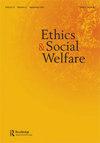基于社区的参与性研究中的参与与代表伦理
IF 0.9
Q4 SOCIAL WORK
引用次数: 1
摘要
本文关注社区参与式研究(CBPR)从开始到发表后的伦理问题。CBPR的核心是一种协作的伙伴关系方法,这种方法认识到合作伙伴的优势,并在研究过程中吸收他们独特的声音和知识。虽然在CBPR研究实践过程中出现的伦理复杂性可以超越单个项目,但它们也基于项目、社区和研究伙伴的特殊性。本文反映了过去三年在爱尔兰进行的两个参与式住房社会政策研究项目的经验。这些项目涉及与全国农村地区的老年人和近海岛屿小社区的居民合作。本文探讨了参与伦理(关于参与和获取的方法)和表现伦理(包括研究成果的描述和分享),并认为研究人员必须注意每个项目的特殊性,并积极地在研究如何建立、进行、表现和传播方面产生有机的研究伦理。这样做,我们可以更好地在整个研究过程中发展的关系中培养代理和真实性,并反思和满足共同的价值观和责任。本文章由计算机程序翻译,如有差异,请以英文原文为准。
The Ethics of Engagement and Representation in Community-based Participatory Research
ABSTRACT This paper focuses on ethics in community-based participatory research (CBPR) from inception to post-publication. Central to CBPR is a collaborative, partnership approach that recognises the strengths of partners and engages their distinctive voice and knowledge in the research process. While the ethical complexities that arise in the course of research practice in CBPR can transcend individual projects, they are also grounded in the particularity of the project, community, and research partners. This paper reflects on the experiences of two participatory social policy research projects on housing in Ireland, conducted over the past three years. These projects involved collaborating with older people living in rural areas nationwide and with residents of small communities on offshore islands. The paper explores the ethics of engagement (regarding methods of involvement and access), and the ethics of representation (incorporating the depiction and sharing of research findings) and argues that researchers must pay attention to the specificity of each project and be alive to generating an organic research ethics in how research is set up, conducted, represented, and disseminated. In so doing, we can better foster agency and authenticity in the relationships developed throughout research processes and reflect on and meet shared values and responsibilities.
求助全文
通过发布文献求助,成功后即可免费获取论文全文。
去求助
来源期刊

Ethics and Social Welfare
SOCIAL WORK-
CiteScore
1.60
自引率
20.00%
发文量
36
期刊介绍:
Ethics and Social Welfare publishes articles of a critical and reflective nature concerned with the ethical issues surrounding social welfare practice and policy. It has a particular focus on social work (including practice with individuals, families and small groups), social care, youth and community work and related professions. The aim of the journal is to encourage dialogue and debate across social, intercultural and international boundaries on the serious ethical issues relating to professional interventions into social life. Through this we hope to contribute towards deepening understandings and further ethical practice in the field of social welfare. The journal welcomes material in a variety of formats, including high quality peer-reviewed academic papers, reflections, debates and commentaries on policy and practice, book reviews and review articles. We actively encourage a diverse range of contributions from academic and field practitioners, voluntary workers, service users, carers and people bringing the perspectives of oppressed groups. Contributions might include reports on research studies on the influence of values and ethics in social welfare practice, education and organisational structures, theoretical papers discussing the evolution of social welfare values and ethics, linked to contemporary philosophical, social and ethical thought, accounts of ethical issues, problems and dilemmas in practice, and reflections on the ethics and values of policy and organisational development. The journal aims for the highest standards in its published material. All material submitted to the journal is subject to a process of assessment and evaluation through the Editors and through peer review.
 求助内容:
求助内容: 应助结果提醒方式:
应助结果提醒方式:


